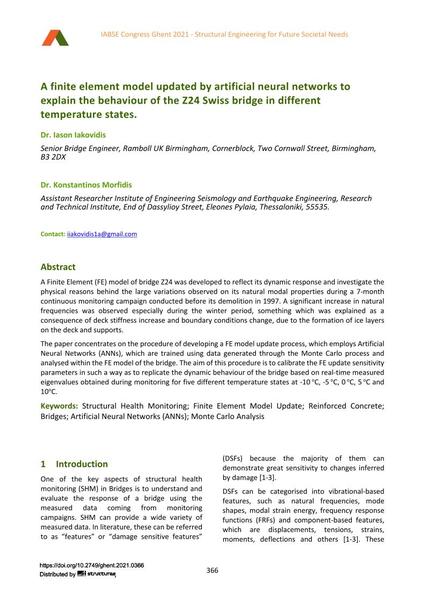A finite element model updated by artificial neural networks to explain the behaviour of the Z24 Swiss bridge in different temperature states.

|
|
|||||||||||
Bibliografische Angaben
| Autor(en): |
Iason Iakovidis
(Senior Bridge Engineer, Ramboll UK Birmingham, Cornerblock, Two Cornwall Street, Birmingham, B3 2DX)
Konstantinos Morfidis (Assistant Researcher Institute of Engineering Seismology and Earthquake Engineering, Research and Technical Institute, End of Dassylioy Street, Eleones Pylaia, Thessaloniki, 55535.) |
||||
|---|---|---|---|---|---|
| Medium: | Tagungsbeitrag | ||||
| Sprache(n): | Englisch | ||||
| Tagung: | IABSE Congress: Structural Engineering for Future Societal Needs, Ghent, Belgium, 22-24 September 2021 | ||||
| Veröffentlicht in: | IABSE Congress Ghent 2021 | ||||
|
|||||
| Seite(n): | 366-375 | ||||
| Anzahl der Seiten (im PDF): | 10 | ||||
| DOI: | 10.2749/ghent.2021.0366 | ||||
| Abstrakt: |
A Finite Element (FE) model of bridge Z24 was developed to reflect its dynamic response and investigate the physical reasons behind the large variations observed on its natural modal properties during a 7-month continuous monitoring campaign conducted before its demolition in 1997. A significant increase in natural frequencies was observed especially during the winter period, something which was explained as a consequence of deck stiffness increase and boundary conditions change, due to the formation of ice layers on the deck and supports. The paper concentrates on the procedure of developing a FE model update process, which employs Artificial Neural Networks (ANNs), which are trained using data generated through the Monte Carlo process and analysed within the FE model of the bridge. The aim of this procedure is to calibrate the FE update sensitivity parameters in such a way as to replicate the dynamic behaviour of the bridge based on real-time measured eigenvalues obtained during monitoring for five different temperature states at -10°C, -5°C, 0°C, 5°C and 10°C. |
||||
| Stichwörter: |
Brücken Stahlbeton
|
||||
| Copyright: | © 2021 International Association for Bridge and Structural Engineering (IABSE) | ||||
| Lizenz: | Die Urheberrechte (Copyright) für dieses Werk sind rechtlich geschützt. Es darf nicht ohne die Zustimmung des Autors/der Autorin oder Rechteinhabers/-in weiter benutzt werden. |
||||
